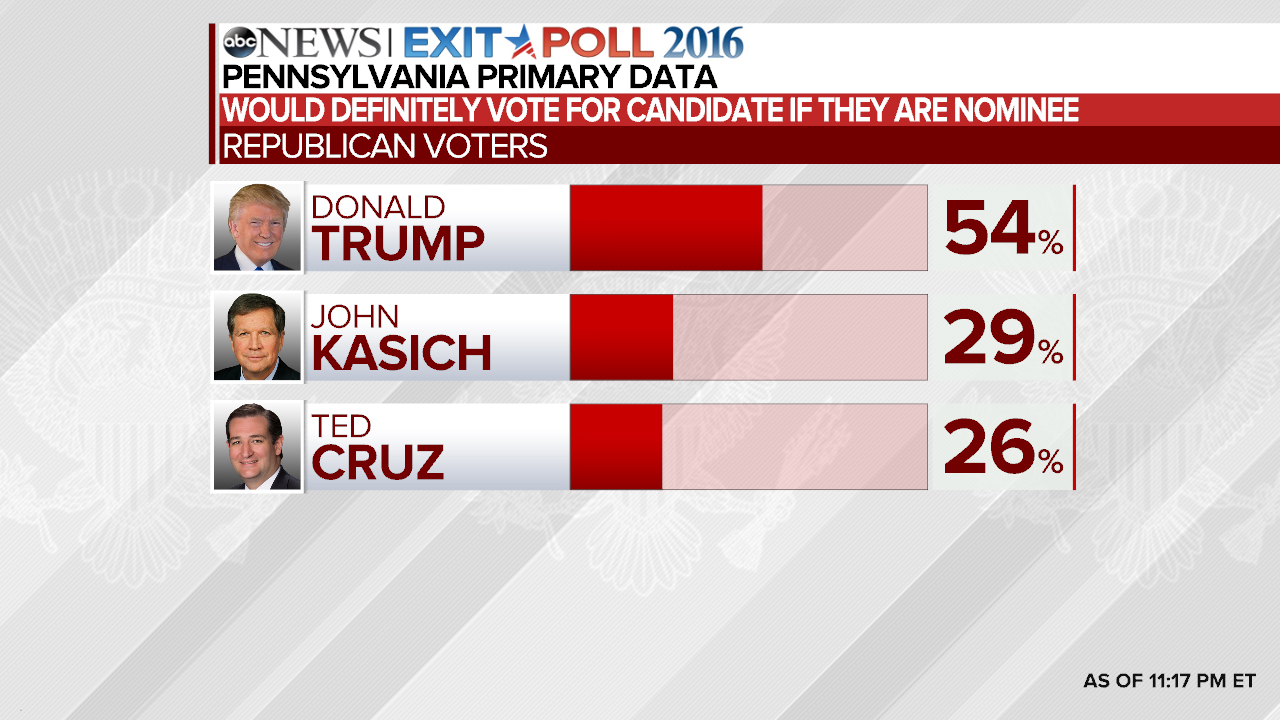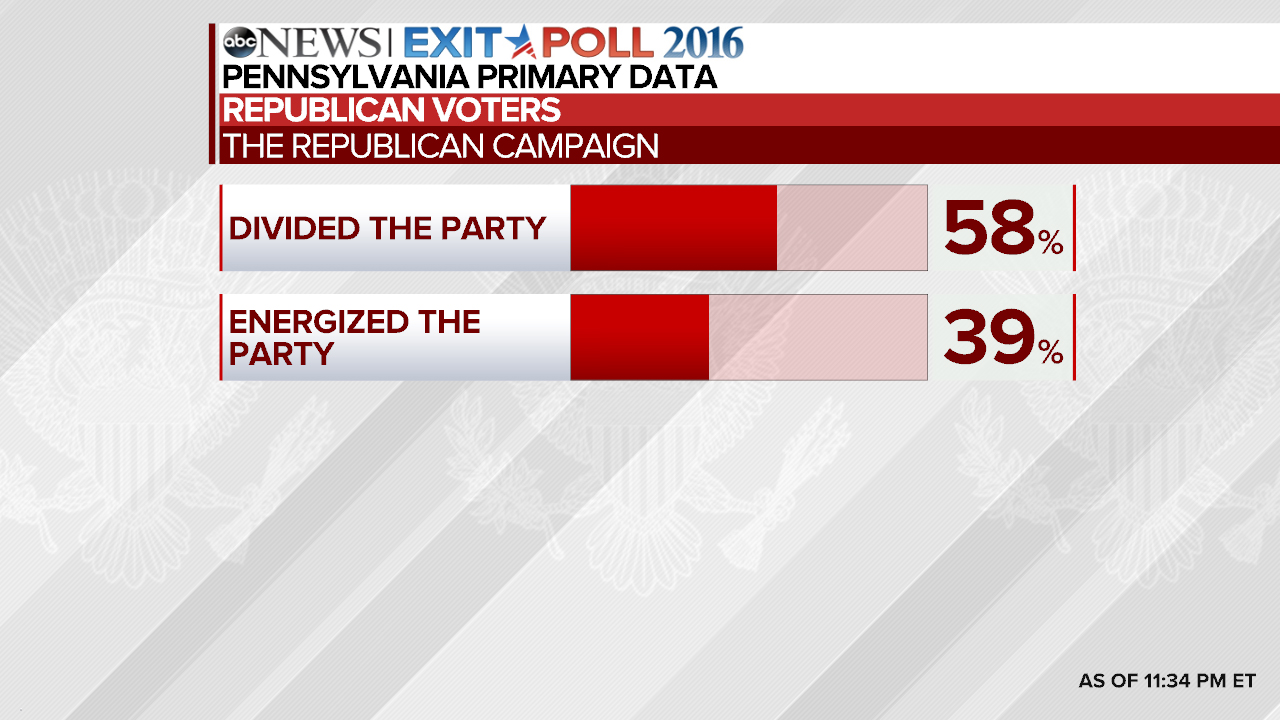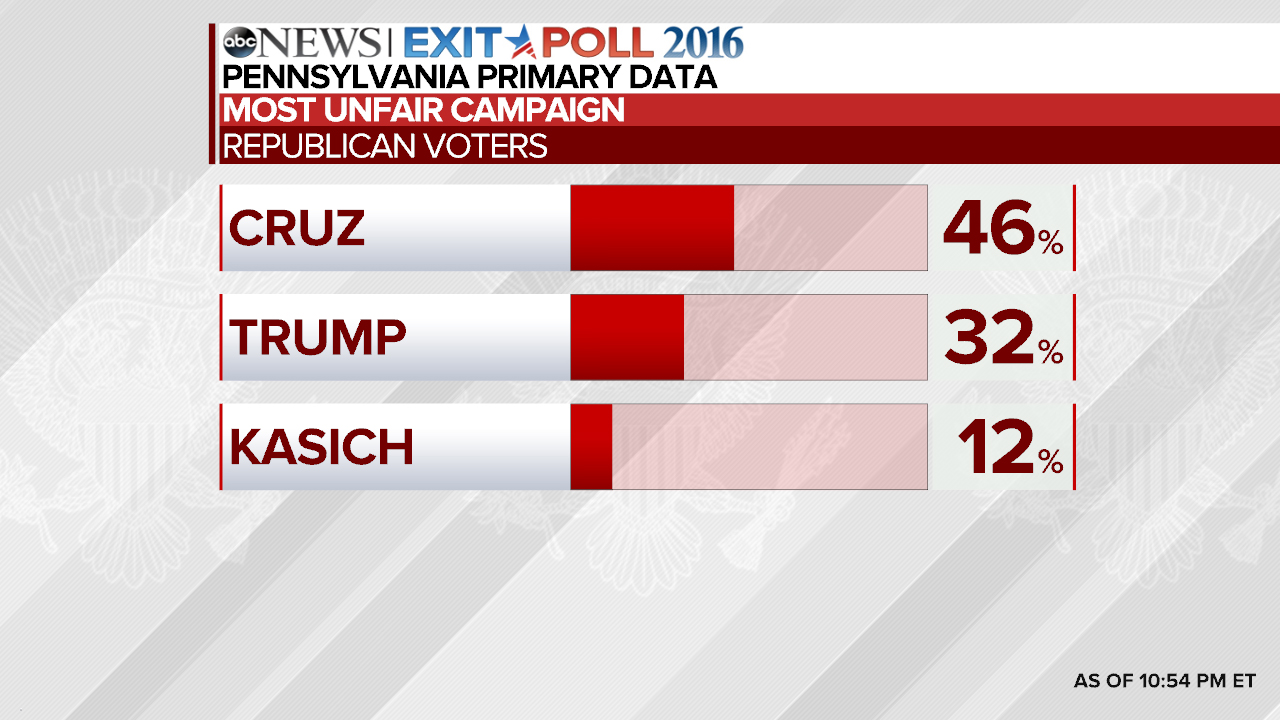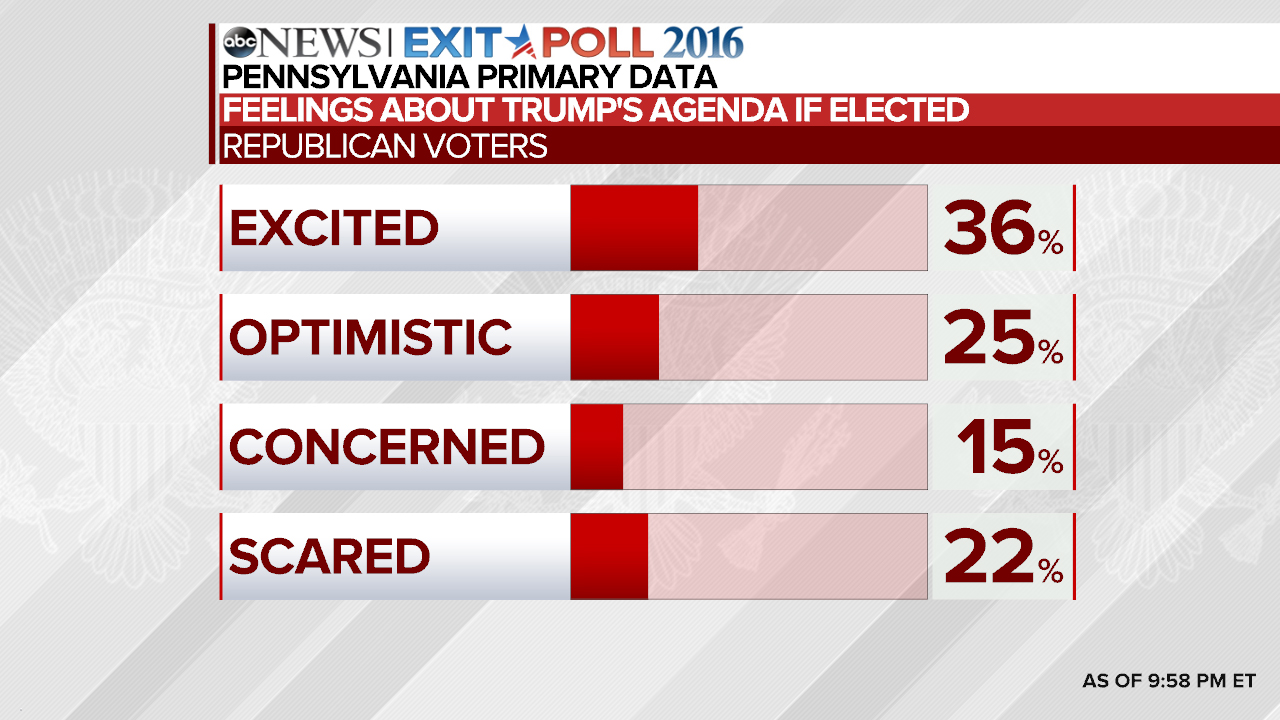Northeastern Primaries: Republican Exit Poll Analysis
Who turned out in Tuesday's primary and what motivated their votes?
— -- Republicans voted on Tuesday in five primaries: Connecticut, Delaware, Maryland, Pennsylvania, and Rhode Island.
Who turned out and what motivated their votes?
The ABC News Analysis Desk has analysis of the exit polls.
Donald Trump dominated against opponents who never had much of a chance in tonight’s Northeastern primaries: A large share of voters made up their minds long ago for Trump, and his opponents struggled to gain votes even in their top support groups – who were thin on the ground.
Emerging Themes
Who decides? Talk of a contested convention is all the buzz in this year’s GOP contest, and it sharply divides Republican primary voters in preliminary exit poll results in Pennsylvania, Maryland and Connecticut. Donald Trump’s supporters almost unanimously say the candidate with the most votes should win the nomination, even if he lacks a majority of delegates. Among those who back Ted Cruz and or John Kasich, by contrast, nearly six in 10 say the delegates – not the vote totals – should call the tune.
Anti-Trump vote? In a sign of his appeal within the GOP, Trump has particularly high affirmative support in preliminary exit poll results. More than eight in 10 Trump voters say their vote was “mainly for your candidate” rather than against his opponents. Fewer Cruz and Kasich supporters say so, albeit still majorities - three-quarters and nearly two-thirds, respectively. A quarter of Cruz’s voters and third of Kasich’s are negatively motivated, voting mainly not for their guy but “against his opponents.”
Vote in November: Eclipsing previous contests, nearly six in 10 in these preliminary results said they’d definitely vote for Trump as the GOP nominee in November. About a quarter flatly rule him out – rising to four in 10 Cruz supporters and more than six in 10 among Kasich voters, another sign of the party’s deep divisions. That leaves Trump’s “definitely support” numbers more than twice as high as the number who rule him out, while Kasich is slightly in the positive direction and Cruz winds up on the negative side.

Early deciders: Nearly six in 10 GOP primary voters in Connecticut, Pennsylvania and Maryland (there were no exit polls conducted in Rhode Island or Delaware) made up their minds more than a month ago, on track for a record this season. Trump won two-thirds of their votes, even better than his customary share of early deciders, about half.
His backers, moreover, were fired up. In Pennsylvania, for instance, six in 10 said they were excited about the things he’d do in office, far better than Ted Cruz and John Kasich’s comparable scores. Indeed one in three Kasich supporters and one in four of Cruz’s said they weren’t voting for their candidate so much as against his opponents. Barely more than one in 10 Trump voters said that about their guy.
Evangelicals: Kasich – and particularly Cruz – had difficulty finding and even holding on to their core constituencies. Barely more than four in 10 voters in the three states with exit polls were evangelical, 14 points off the average in primaries to date. And, remarkably, Trump beat Cruz by more than 25 points in this group, among his best performances among evangelicals. They split their votes between Trump and Cruz, on average, in previous contests.
Wall St.: Substantively, as in New York a week ago and throughout the primaries to date, Trump’s victories were built on economic discontent, his populist outsider image and pushback against other groups:
Economically, more than four in 10 of voters in the three states said that Wall Street hurts the economy more than it helps, ranging as high as nearly half in Pennsylvania. Across states, Trump won two-thirds of the anti-Wall Street vote, peaking at seven in 10 percent in Pennsylvania. Combined, his two opponents got a majority of the pro-Wall Street group – but divided them about evenly.
Attributes: About three in 10 voters in the three largest states voting today say they’re primarily looking for someone who “shares my values,” less prevalent than in previous states, and he attribute on which Trump has done very poorly to date. What’s chiefly boosted him are those looking for a candidate who “tells it like it is” or “can bring needed change” – adding well over half of Republican voters in today’s preliminary exit poll results.
Strong conservatives have been another typically strong Cruz group, but tonight Trump beat him by more than 10 points among very conservative voters in Pennsylvania, Maryland and Connecticut, again among Trump’s best in this group to date. Kasich, for his part, ran 20 points behind Trump among moderates, and their share of the electorate was no bigger in the I-95 states than elsewhere.
Pennsylvania
Party Unity: The difference between Republicans and Democrats in their view of their respective campaigns’ impact on party unity is striking. In the Pennsylvania GOP primary, just four in 10 say the campaign has energized the party, while nearly six in 10 say it’s divided it. (In the Democratic race, by contrast, seven in 10 say their race has energized the party.)

Even among frontrunner Trump’s supporters, barely more than half say the campaign has energized the party, and that drops sharply among Cruz and Kasich voters.
Unfair: For the first time this election cycle, in Pennsylvania, more GOP voters say Cruz ran the most unfair campaign. In every other state where it’s been asked, win or lose, Trump’s been seen as more unfair.

Fear and excitement: Further showing GOP divisions, half of Cruz and Kasich supporters in Pennsylvania say they’d be scared it Trump won the presidency. On the flipside, excitement for a Trump presidency is much higher among Trump supporters (six in 10), than it is among Cruz’s and Kasich’s.

Trump also won two-thirds of voters who are angry about how the federal government is working. And in Pennsylvania he pulled in eight in 10 of those who want an outsider rather than a candidate with political experience, near the record set last week in New York.
Trump’s issues: As elsewhere, GOP primary voters in Pennsylvania express broad interest on some of Trump’s main issues – electing someone from “outside the political establishment (more than six in 10) and banning non-U.S. Muslims from entering the country (seven in 10). Fewer, but more than four in 10, also support deporting undocumented immigrants.
Support for an outsider, Trump’s signature calling card, is higher than the average across primaries this year, while support for his two policy positions is near average.
Economic issues: GOP voters’ economic concerns also continue to work to Trump’s advantage. In Pennsylvania, nearly six in 10 are very worried about the direction of the economy and, by a 10-point margin, more say international trade takes away U.S. jobs than say it creates them. Worried and anti-trade voters have been strong groups for Trump in previous contests.
Muslim/Immigration:Trump also posted huge margins in the Pennsylvania results among those who support temporarily banning Muslims from entering the country and deporting undocumented immigrants.